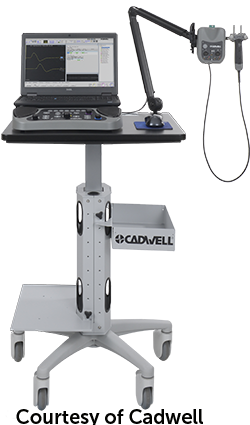Electromyography (EMG) & Nerve Conduction Studies (NCS)

What is an NCS/EMG?
 An NCS/EMG consists of two parts: a nerve conduction study (NCS) and electromyography (EMG). An NCS/EMG is performed to study the electrical properties of the muscles and nerves of the body. This can help identify injury or disease of the area examined.
An NCS/EMG consists of two parts: a nerve conduction study (NCS) and electromyography (EMG). An NCS/EMG is performed to study the electrical properties of the muscles and nerves of the body. This can help identify injury or disease of the area examined.
For example, a herniated disc in the lower back can pinch a nerve going to the leg, causing pain, numbness, tingling and weakness.
The NCS/EMG can localize which nerve is pinched, how badly –and sometimes even how long – the nerve has been injured. This electrical information is unique in that it cannot be obtained from imaging such as X-rays, CAT scans, or MRI.
What is the benefit of an NCS/EMG?
The NCS/EMG testing provides useful information to your physician with few side effects by obtaining electrical information from nerves and muscles. Your physician then can use this diagnostic information to identify the cause of symptoms/clinical signs and to decide which further tests or treatments may be useful.
Who conducts the NCS/EMG testing?
Tests are conducted by physicians who are board certified in Physical Medicine and Rehabilitation with specialized training in electrodiagnostic medicine. The TriHealth team of Physical Medicine Rehabilitation physicians includes members of the American Academy of Physical Medicine & Rehabilitation and the American Association of Neuromuscular and Electrodiagnostic Medicine.
Common questions about NCS/EMG
How is the nerve conduction study performed?
Nerve conduction studies are tests of the nerves to determine how well and how fast your nerves conduct electrical impulses. Recording electrodes will be placed on your skin. You will receive a small electrical tap with a nerve stimulator to activate a nerve. Nerve waveforms for sensation and movement are recorded on a machine. Nerve conduction studies are safe. They can be performed in patients with pacemakers or implanted defibrillators.
How is an EMG performed?
The doctor places a single, small, Teflon-coated wire electrode (pin) into selected muscles in the area to be studied. The tip of the pin acts like an antenna, picking up electrical activity from the muscle and displaying it on a screen.
Are there any side effects?
Occasionally, the EMG examination can cause a bruise. This is more likely to occur in patients on blood thinners (such as Coumadin or Plavix) or anti-inflammatory medications (such as ibuprofen or aspirin). Infections caused by the pin examination are exceedingly rare. EMG/NCS should not limit any activity planned for later in the day. An EMG will not prohibit the patient from returning to work or recreational activity.
Can I have this test if I am pregnant?
Yes. It can be done during pregnancy without harm to you or your baby.
What should I do to prepare for the test?
Please avoid lotions for hands and arms for upper limb testing and legs/feet for lower limb testing. You do not need to stop any medications for the test. You can take your regular medications at the normal times. There is no need to fast for the test.
Can I drive after the test?
Yes. This test does not affect your ability to drive.
Can I return to work after this test?
Yes. This test does not affect your work status.
Does the EMG have a therapeutic value?
The EMG is a test, not a treatment. It should not be confused with acupuncture, which also uses a pin. Occasionally, patients have reported decreased symptoms following an EMG, but this is unpredictable and is not a reason to perform the test.
How long will the test take?
On average, the test requires 30 to 60 minutes. Expect to be in the office for 60 to 90 minutes.
Locations in Anderson, Clifton, Kenwood, Mason, Montgomery, West Chester, Western Hills and Western Ridge.